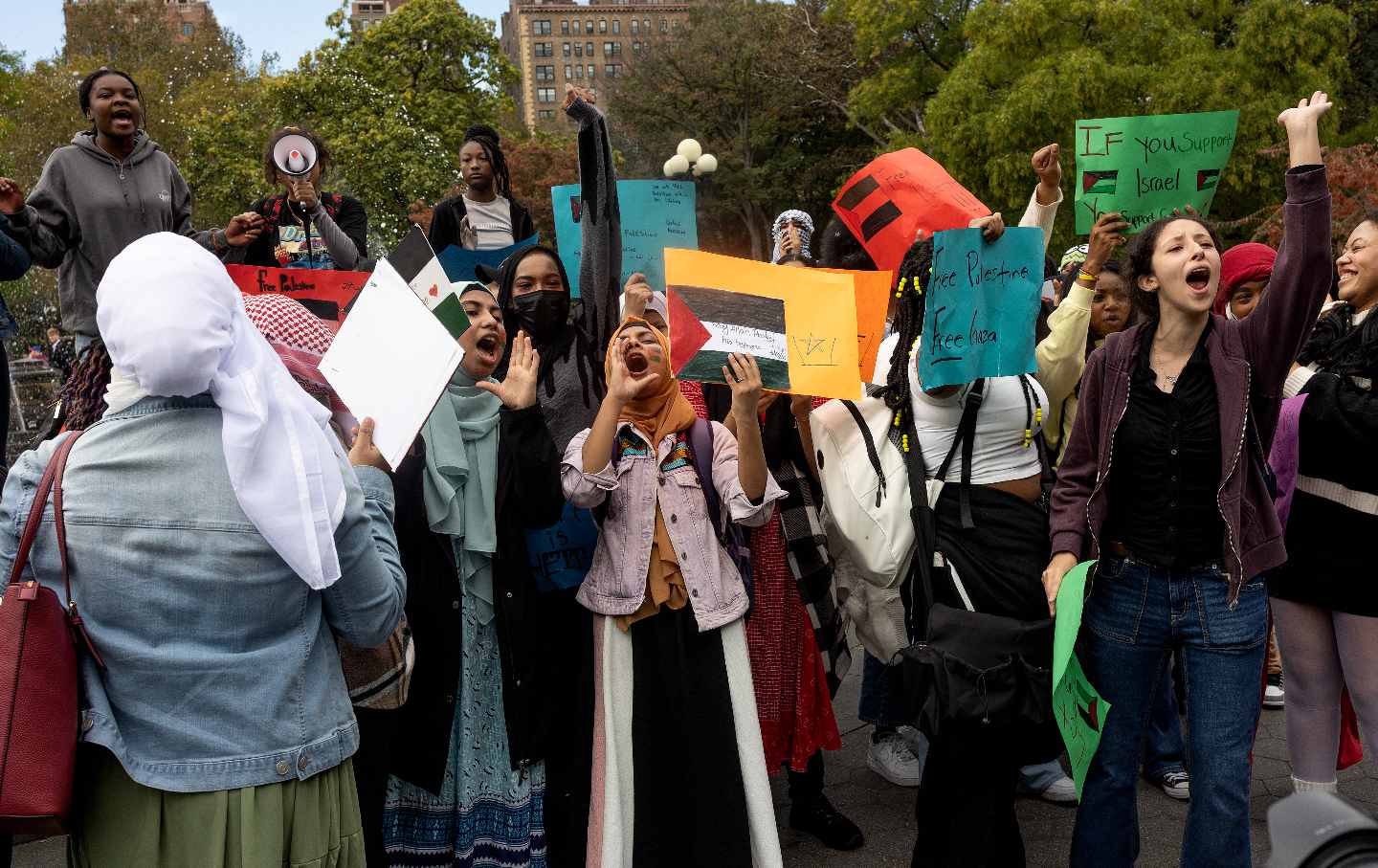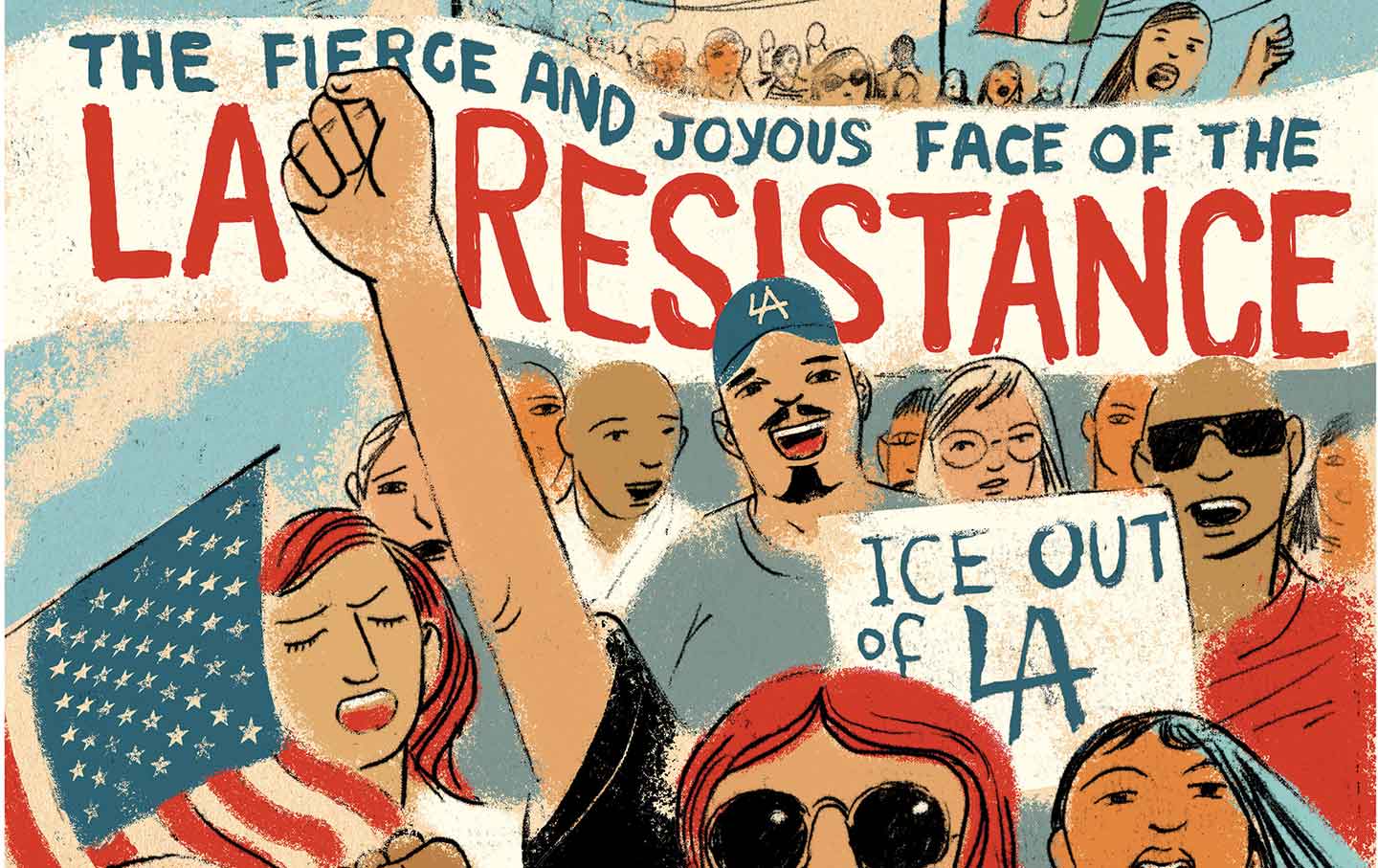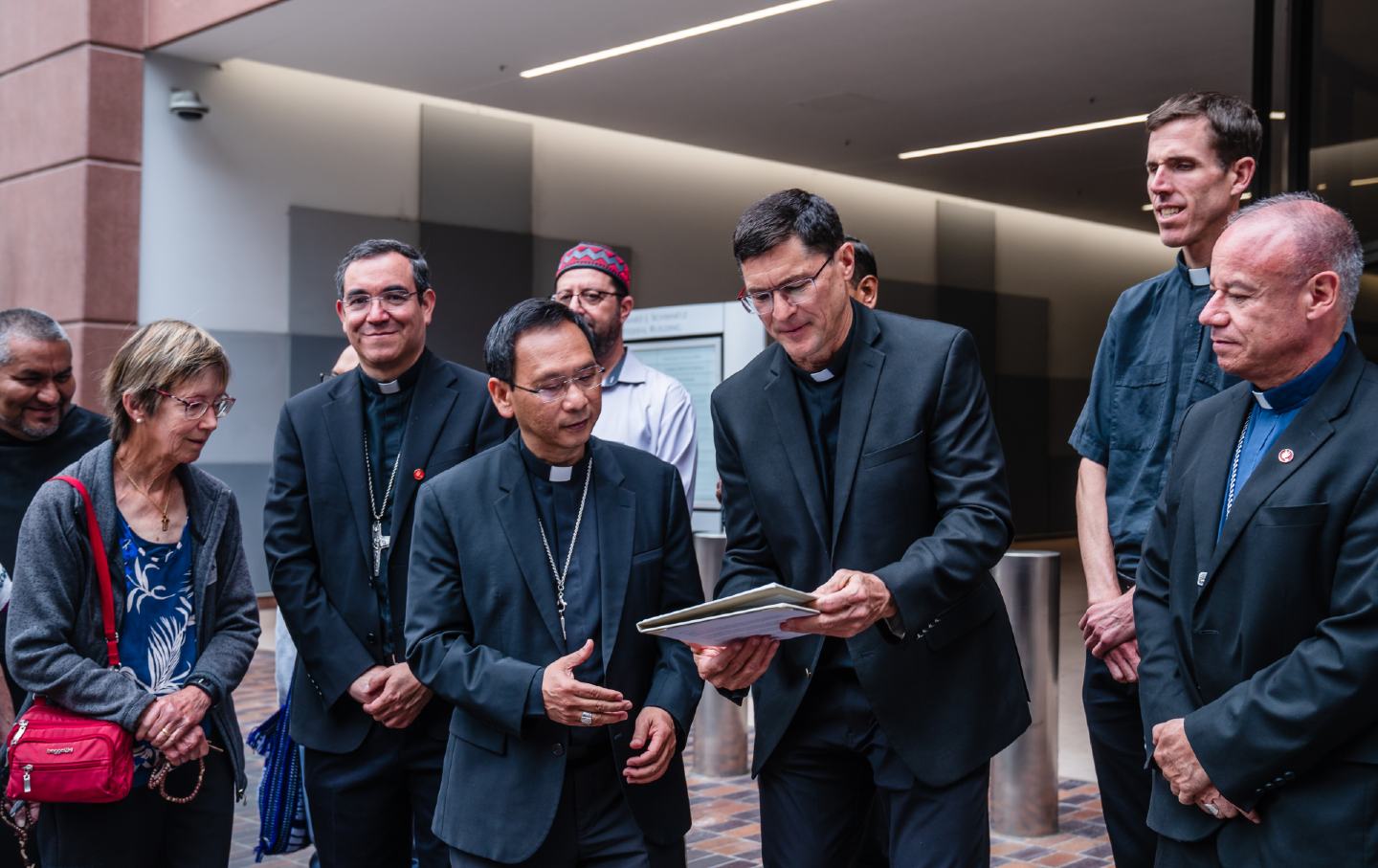The Silencing of Student Voices
Over the last year, student perspectives have been repeatedly ignored, dampening the impact young people have on their learning environment.

High school students join a walkout to protest the Israeli bombardment of Gaza.
(Andrew Lichtenstein / Getty)For this series, five young journalists responded to our calls for articles detailing critical issues that impacted young people this year. The group of high school and young college writers pitched and reported on urgent topics like lack of access to mental health support for homeschooled students, student voices being silenced in schools, book bans, attacks on LGBTQ+ students, and school shootings. Of course, these are just a fraction of the issues that shape the lives, conditions, and experiences of young people—not to mention how these issues intersect with each other. We received more important pitches than we could publish this round. As we close out the year, this package centers the work of young journalists reporting on what affected their schools, communities, and peers in 2023.
—Rainesford Stauffer
When Madison Harden was a junior at Lake Highland High School in Texas, students rallied to protest the administration’s inaction to multiple racist incidents, including unequal treatment of students and teachers using slurs. “It was years of experience and it got to the point where it was too much and boiled over, and rightfully so, they held a protest,” says Harden.
Afterwards, she noticed that, despite having a diverse student body, her school had never hosted any multicultural events. In response, the administration suggested a teacher-run school-wide event to celebrate Black History Month. For the event, a teacher proposed a historical reenactment of the transatlantic slave trade, asking Black and white students to dress up as slaves and slave masters.
Harden believes that if the administration had consulted with students, the offensive situation could have been prevented. “That was a moment where I was like, see, this is when you need to listen to students,” Harden says. She has been trying to create spaces where she can be impactful on school policy, but adds “the education system has reminded me constantly, possibly, again, that my voice is not going to matter.”
This example of student perspectives being ignored is just one of many from this past year. Throughout 2023, high school students vocalized their opinions on everything from LGBTQ+ rights, book bans, gender bias in dress codes, and more.
After October 7, for example, the Beacon School in Manhattan, my own high school, sent a school-wide address over e-mail calling Palestine one of the “neighboring areas” impacted by the ongoing conflict in which about 20,000 Palestians have since been killed. Some students saw the announcement as an attempt by the administration to erase Palestine’s existence from history. They organized a school-wide walkout on November 9 with over 50 students that ended by joining several other New York City high schools in calling for a cease-fire at a protest in Bryant Park.
Darasima Bankole, a 17-year-old at Douglas County High School in Georgia, says her principal recently banned extracurricular organizations from decorating the halls with handmade flyers. She fears that this is a new way for the administration to dampen the impact students have on their learning environment. A 2022 study published by the American Journal for Education found that an increased responsiveness to student voices leads to “higher GPAs, fewer absences, and less chronic absenteeism.”
“If I had more of a say in what I was learning, I think for sure, I would be more engaged,” said Bankole.
Asmaa Ali, a 17-year-old student at Martin Luther King Jr. Academic Magnet School in Tennessee, echoes the idea that while many schools put students first in theory, it rarely happens in practice. “You can’t say that you support students and their identity, and you see them, but then you try to prohibit expression of religious beliefs, political beliefs, social beliefs,” she said. Ali has been a student in several school districts and thinks that while schools encourage student engagement, they almost never welcome student opinion.
Her school adopted a controversial policy required by the Metro Nashville Public School District: Students cannot sign up for clubs without parental approval. She says this is because the district did not want students signing up for clubs like the Gay Straight Alliance without their parents knowing.
Nationally, politicians and policymakers have passed hundreds of bills giving parents increased power to influence curriculum and resource materials in schools, giving rise to a new parents’ rights movement, raising questions about how much parental opinion should influence school dynamics. “Around the country, we are seeing student and educator voices being silenced in this larger parents’ rights movement, which often places politics over parents anyway,” said Allie Pearce, K-12 policy analyst for the Center for American Progress.
Pearce acknowledges the responsibilities schools have to parents and the government, but points out that there should be a focus on creating democratic environments for students. “Students should be treated as agents of the community and agents of power,” said Pearce. “Everybody is responsible for creating a more inclusive environment, especially students.”
For example, Pearce believes that students having voting power on school boards and school committees—including student representatives—would ensure that students have a voice in shaping educational decisions and policies.
Popular
“swipe left below to view more authors”Swipe →Harden, now a freshman at Howard University, started a club on campus modeled after the Texas organization Young Leaders Strong City that holds a racial equity summit every year to amplify student voices. She created the group to bridge the divide between administrators, educators, and students, believing that change in school systems is possible. “I think it’s going to require administrators and teachers to step outside of their own lens and experience. I think it’s going to require being uncomfortable. And it’s going to require patience, and adaptability.”
More from The Nation

Liberals Think Antifa Isn’t Real. But It Is—and It Knows How to Win. Liberals Think Antifa Isn’t Real. But It Is—and It Knows How to Win.
To protect us all from the violence of the Trump administration, we must defend antifa.

Want to Stop ICE? Go After Its Corporate Collaborators. Want to Stop ICE? Go After Its Corporate Collaborators.
ICE can’t function without help from the private sector. So we should force the private sector to stop helping.

Honoring the Progressives Fighting for Our Democracy Honoring the Progressives Fighting for Our Democracy
These activists and artists, pastors, and political leaders know what has always been true: The people have the power.

Anger at Corporate Power Is Everywhere Anger at Corporate Power Is Everywhere
It should guide the Democrats.

The Fierce and Joyous Face of LA Resistance The Fierce and Joyous Face of LA Resistance
What we can learn from a great American city’s refusal to bend to Trump’s invasion.

San Diego’s Clergy Offer Solace to Immigrants—and a Shield Against ICE San Diego’s Clergy Offer Solace to Immigrants—and a Shield Against ICE
In no other US city has the faith community mobilized at such a large scale to defend immigrants against the federal government.


